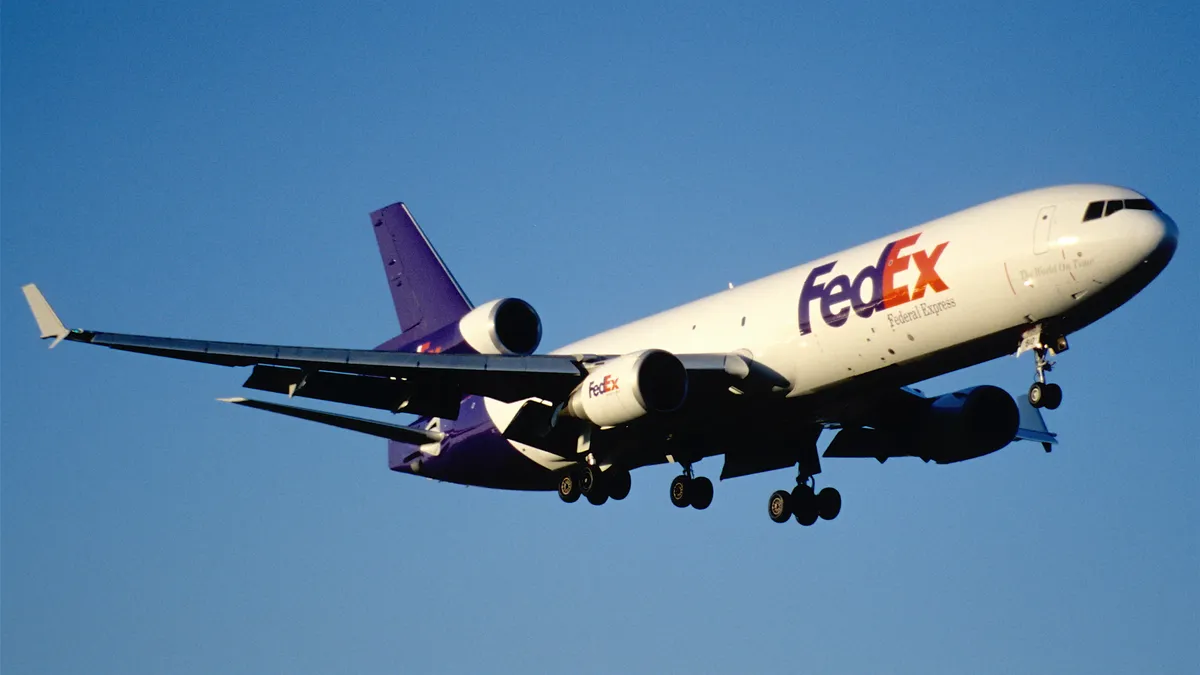Dive Brief:
- FedEx will be one of McKesson’s logistics partners in the distribution of coronavirus vaccines, Health and Human Services Secretary Alex Azar said during a press conference Thursday which took place in FedEx’s World Hub in Memphis, Tennessee. It had previously been reported that FedEx would assist in distribution for Pfizer, which is bypassing McKesson.
- "In the case of the Pfizer vaccine, Pfizer will ship directly through FedEx, and we will use McKesson to marry their product up with the vaccination administration kit," Azar said, noting that states are in charge of deciding where vaccines will be shipped.
- HHS estimates 6.4 million doses of Pfizer’s vaccine and 12.5 million doses of Moderna’s vaccine will be available in the first week after authorization. Drug manufacturers will ship half of their available doses when an emergency use authorization is announced in order to ensure a second dose is available in 21 and 28 days for the Pfizer and Moderna vaccines, respectively, Azar said.
Dive Insight:
Federal officials on Thursday laid out a speedy supply chain operation that they say will begin shipping vaccines within 24 hours of an authorization. Vaccines are expected to be available for immunizations within 48 hours after the authorization.
"We are just a matter — we believe — of days away from when we will begin to distribute tens of millions of doses," Vice President Mike Pence said Thursday.
FedEx executives said the logistics company's Express network will play a pivotal role in the delivery of the vaccines.
"We have more than 90 cold chain facilities on five continents that will be ready if necessary, where we can stage temperature-sensitive product, and have plans to expand that number to 115 locations next year," FedEx Express Regional President of The Americas Richard W. Smith said at the press conference.
Smith also highlighted the company's SenseAware technology that will assist in tracking the shipments.
Cold storage locations will play an important part in distributing all of the vaccines, but especially the Pfizer immunization, which has to be stored at minus 70 degrees Celsius and needs dry ice to maintain the temperature during shipping.
Manufacturers have already begun to stage vaccine inventory around the world, and Pfizer and Moderna have applied for emergency use authorization. The Federal Aviation Administration confirmed the first distribution flight of the coronavirus vaccine took place last week.
Pfizer said it distributed its "investigational vaccine" to 150 sites around the world throughout its research process, which has helped to inform the company’s distribution plans. AstraZeneca said its "doses that have been manufactured to date are spread across the global supply chain with more than 20 supply partners in more than 160 countries, supported by more than 20 analytical testing centers," according to an emailed statement.
The Department of Defense said last week that Pfizer and McKesson had partnered with Operation Warp Speed on a series of trial shipments and said more trial shipments are scheduled for the coming weeks.
"While shipments did not include actual vaccines or ancillary kitting, they provided recipients a first look at the shipping processes and containers, as well as temperature monitors that will be used for distributing the Pfizer vaccine," the DOD said in a release.
Director of the Tennessee Emergency Management Agency Patrick Sheehan said at the Thursday press conference that the state had also been working with partners on vaccine distribution exercises. One lesson from the trial runs has been that it will likely be easier to move people to the vaccine in the case of the ulta-cold immunizations.
"When we have it located where we know it’s going to be maintained well ... it is easier to plan to bring people to the vaccine than have to bring the vaccine that next mile," Sheehan said. "Ultra-cold storage does present new challenges, but our teams are prepared."
Companies are aware of the challenges and have included notes on distribution hurdles in their forward-looking statements.
"Moderna may encounter delays in meeting manufacturing or supply timelines or disruptions in its distribution plans for mRNA-1273," the company said in its press release about seeking emergency use authorization.














